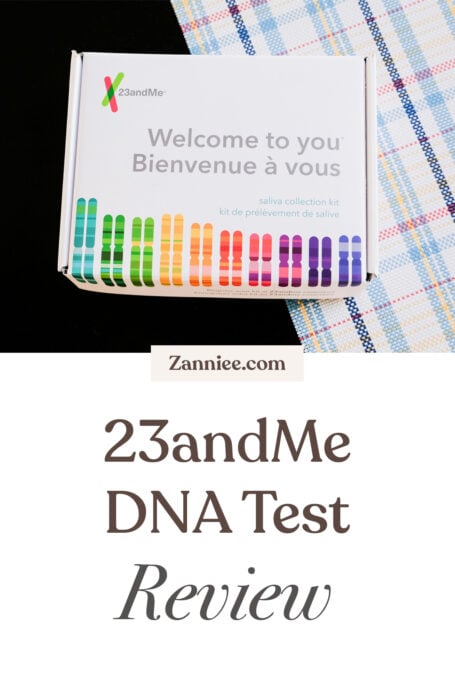Pros and Cons of the 23andMe DNA Genetic Test
When you purchase through links on this site we may earn a commission at no extra cost to you. This helps us provide free content for you to enjoy.
I've always wanted to take one of these at-home DNA tests where you spit in a tube and mail it in to get it analyzed. When I received the 23andMe Health + Ancestry DNA Service as a Christmas gift, I decided to write an in-depth review of my experience.
Summary of Pros and Cons
I'm not sure I would recommend these kinds of at-home DNA tests to everyone. It really depends on your goals. Here are my pros and cons for this particular DNA test.
Pros:
- Gives a broad ancestry composition
- Instills pride in your cultural background(s)
- Interesting info on genetics traits
- Health assessment and support
- Option to find relatives
- Can download raw DNA data to upload onto other sites for more insights
Cons:
- Inexact science - ancestry results are based on a lot of guess work.
- Can cause unnecessary health anxiety
- If opted in to find relatives, can discover surprise relatives
- DNA data harvesting — Google is an investor
- Risk of privacy invasion
If you're interested in learning more about these pros and cons in detail, read on. First, I will give a rundown of my personal experience and some of my DNA results.
23andMe Process
The box comes with a pre-paid postage label. Follow the simple instructions and seal the package. Makes sure to register the kit on their site with your 14-digit barcode before mailing.
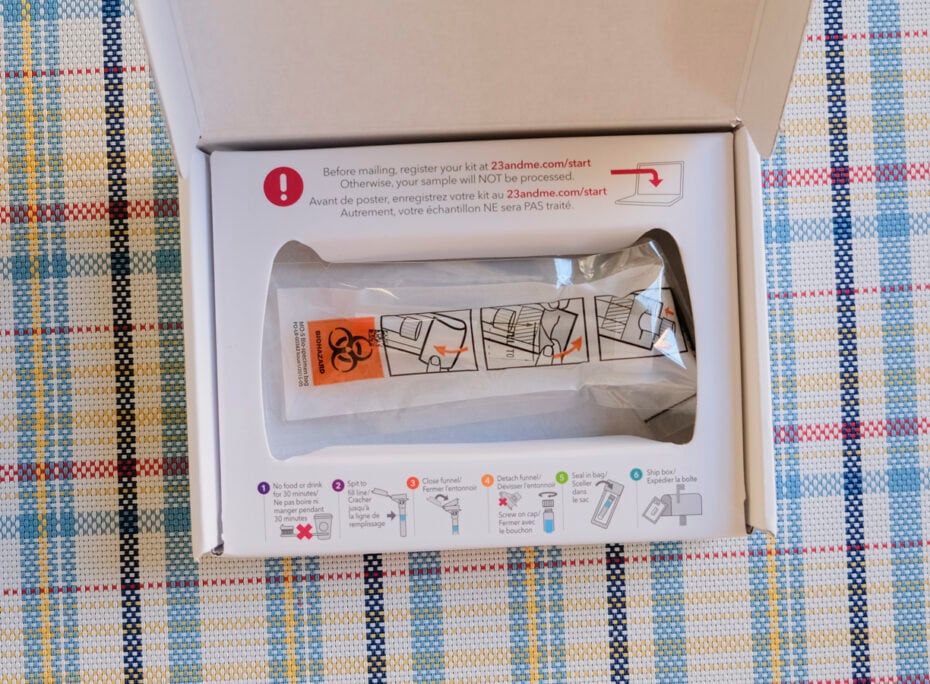
23andMe sent me email updates on what was happening with my DNA sample up until my full results were ready. They take around a month to process.
My Ancestry Results
I didn't really expect to have wacky results. An Indian friend got 99% Indian, so I was bracing for something similar in terms of my Chinese heritage. 23andMe says I'm 95.6% Chinese and... 4.4% Korean, a surprising twist. Korean people have mistaken me for one of their own, so it's nice that I can now tell these Ajummas that yes, I have a little Korean ancestry... maybe. (These results are never 100% accurate. More on that later.)
My 23andMe gives optional educational tutorials, such as the basics of how DNA works, which I found helpful as someone who knows very little about this stuff.
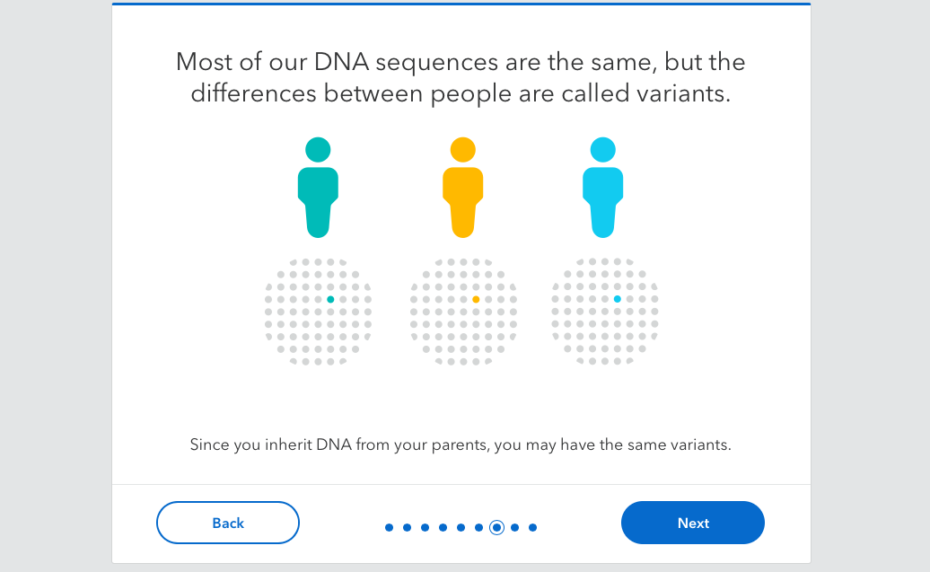
None of my immediate family members have done the 23andMe test, but if they ever decide to, the system can link us into a family tree and tell us more about our ancestry.
There's also an option to register a profile to find relatives, which I chose not to do.
My Health Report
Since I got this as a gift, I didn't get to choose between the two packages. Mine included the Health section, which I probably wouldn't have chosen for myself to avoid any unnecessary health anxiety. Thank goodness my results say I'm not genetically predisposed to their list of health problems and I don't have carrier status for their long list of health conditions and diseases.
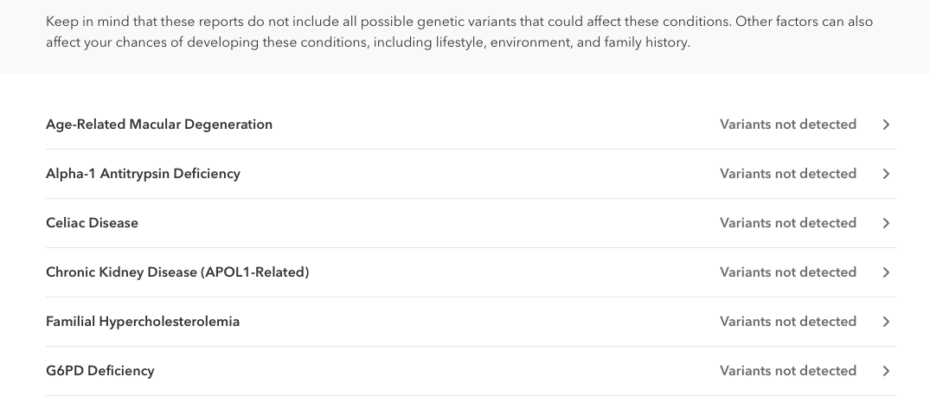
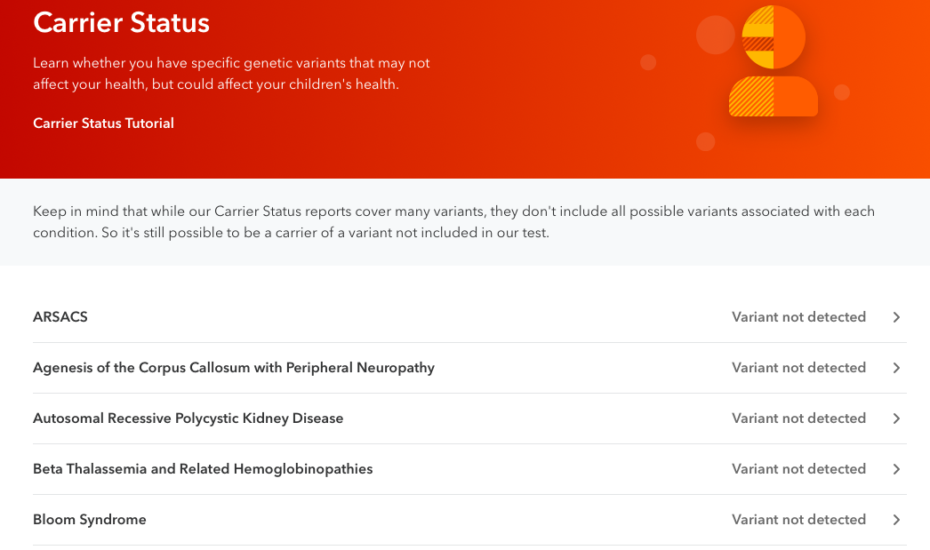
When I first made my profile, I had the option of opting out of receiving the results for the following:
- BRCA1/BRCA2 (Selected Variants) - associated with breast cancer
- MUTYH-Associated Polyposis - associated with colorectal cancers
- Late-Onset Alzheimer’s Disease
- Parkinson’s Disease
I opted out. I feel that testing for these serious diseases with no definite cures could cause major health anxiety. Is it a benefit to prepare for your demise? Even if you do test for a variant, it doesn't mean you will get the disease. It just means you are at risk for it.
If you test that you're not at risk, it doesn't mean you're home-free either. Their reports do not cover all the factors that might influence risk; it is possible to have other genetic risk variants not included in these reports. It's important to note that doing this DNA test is also not a substitute for seeing medical professionals.
If you don't want the health reports at all, you can just get their Ancestry + Traits Service.
My Traits + Wellness Reports
My favourite part of the report is on Traits and Wellness. The Traits are divided into three parts: The Physical, Taste & Smell, and Weird & Wonderful.
They were mostly accurate in detecting my physical traits, such as having brown eyes, or that I lack a cleft chin or cheek dimples. Some were almost half and half, such as having 55% of photobleaching hair, which means that hair lightens after long exposure to the sun.
The Taste & Smell portion told me that I can smell asparagus odour and that I have slightly higher odds of disliking cilantro. Random stuff, but true.

The Weird & Wonderful section was fun. How did it know that I have misophonia? I hate the sound of chewing! (If you ever eat with me, please chew with your mouth closed.) The report even tells me the time I'm likely to wake up. I don't have a photic sneeze reflex, where one sneezes when exposed to bright light. I didn't even know people experienced that. Very odd stuff.
Pros of the 23andMe Health + Ancestry DNA Service
The big draw to this test is finding out your ancestry composition. It's fun, as long as you don't take it too seriously. I already know that I am Chinese, so I have confidence in my results. Having it confirmed and seeing which regions of China my ancestors are likely to have come from made me even more connected to my culture. Having a little bit of Korean DNA in there is cool too.
The traits report was also extremely fascinating. The health reports, as long as you're not an anxious person, can make you feel empowered and motivate you to better take care of yourself.
The option to find relatives have been invaluable to helping people find birth parents and missing relatives.
Lastly, I've heard of people downloading their raw DNA data from their 23andMe profiles and then uploading them onto other sites such as Promethease, WeGene (which has a larger Asian database), and MyHeritage for more insights. I haven't tried this and probably won't be any time soon. I would do more research on the companies to see what sort of info they'll provide. You may not be able to opt out of receiving some anxiety-inducing health reports, for example.
Cons of the 23andMe Health + Ancestry DNA Service
My main concern with 23andMe's Ancestry reports, as well as with other direct-to-consumer DNA tests, is that people will take the results as gospel. A lot of it is based on guesswork based on the DNA profiles they currently have in their database. Your results can change when their system's database and math are updated.
I think 23andMe's results on continents, and maybe countries, are fairly reliable, but once you into specific regions, I would take the results with a grain of salt.
If you go into your ancestry section, under "Your Ancestry Composition Chromosome Painting," the default setting is 50% Confidence Level, which makes it speculative. You can see that in the top right corner here:
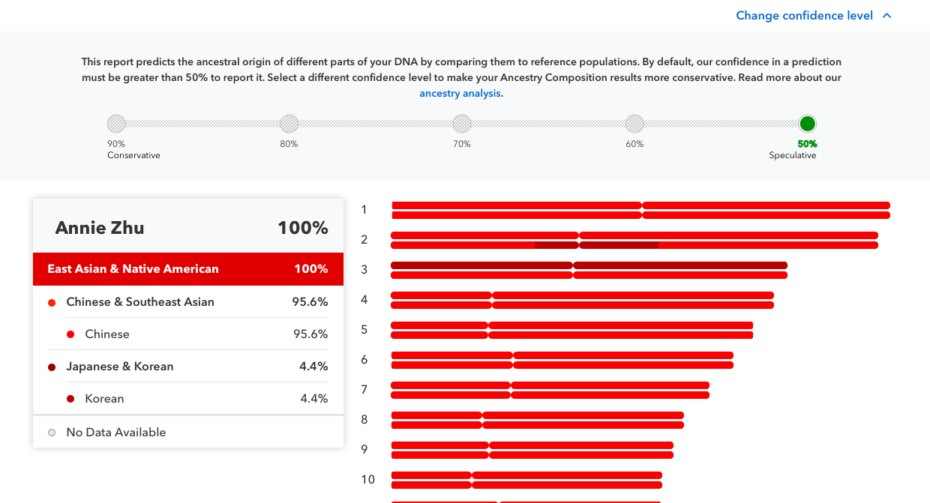
They are only 50% confident that I'm 95.6% Chinese and 4.4% Korean. But If I change that setting to 90%, the results change:
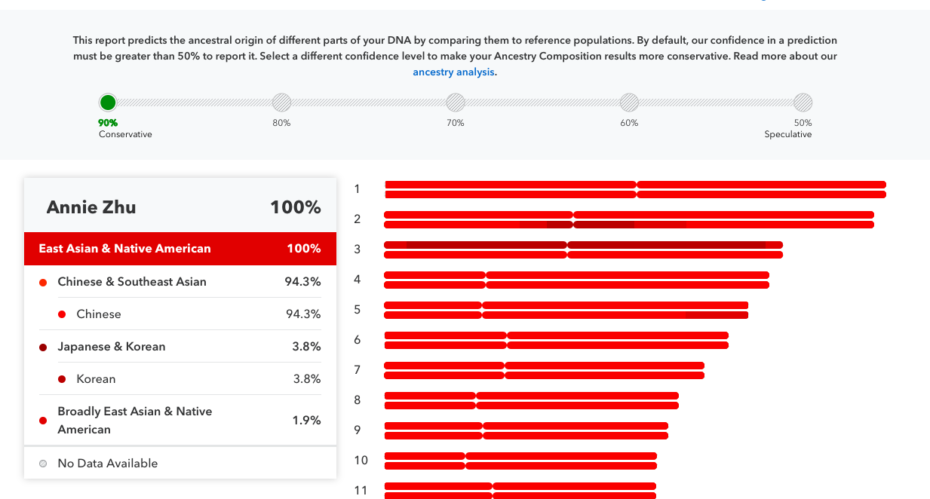
The results are informed guesses but they are never 100% accurate, so don't take them too seriously.
I watched this CBC Marketplace video of twins taking several DNA tests, and they got different results. I highly recommend watching that video to learn how these companies come to their conclusions. Something of note from it is that our entire DNA is made out of 3 billion parts. These at-home DNA services test less than 1% of that. Then they compare your variants to groups of people in their databases.
The health portion of the test is more accurate—23andMe claims 99% accuracy. It's up to you to decide whether it would be empowering to know which health conditions and diseases you may be at risk for. It can save lives, or it can cause anxiety.
Having a risk variant does not mean someone will definitely develop that condition, and I think getting results like that just plants worry about the future. However, if you're someone who can take in these health reports without letting them affect you, you can lean into the benefits, such as developing an action plan so you can maintain good health as you age.
In an extreme case, this woman tested for BRCA1 (which I opted out of). She did have a gene mutation and proceeded to consult medical professionals. They ran tests and confirmed the mutation. Long story short, although she wasn't diagnosed with breast cancer, she assessed the risks and decided to have a mastectomy with implant reconstruction as a preventative measure.
So is it better to know? You decide.
If you're concerned about privacy, I would recommend reading 23andMe's complete Privacy Policy. Some statements of note:
- You may discover things about yourself and/or your family members that may be upsetting or cause anxiety and that you may not have the ability to control or change.
- You may discover relatives who were previously unknown to you, or may learn that someone you thought you were related to is not your biological relative.
- In the event of a data breach it is possible that your data could be associated with your identity, which could be used against your interests.
23andMe can share your DNA with law enforcement if subpoenaed. They managed to catch the Golden State Killer with the DNA of a distant relative from one of the DNA databases. You're likely not a criminal, but if you're in the database, they can track down members of your family who have committed a crime. (This may be a pro, not a con, depending on your moral beliefs.)
- Under certain circumstances your Personal Information may be subject to processing pursuant to laws, regulations, judicial or other government subpoenas, warrants, or orders. For example, we may be required to disclose Personal Information in coordination with regulatory authorities in response to lawful requests by public authorities, including to meet national security or law enforcement requirements. 23andMe will preserve and disclose any and all information to law enforcement agencies or others if required to do so by law or in the good faith belief that such preservation or disclosure is reasonably necessary to: (a) comply with legal or regulatory process (such as a judicial proceeding, court order, or government inquiry) or obligations that 23andMe may owe pursuant to ethical and other professional rules, laws, and regulations; (b) enforce the 23andMe Terms of Service and other policies; (c) respond to claims that any content violates the rights of third parties; or (d) protect the rights, property, or personal safety of 23andMe, its employees, its users, its clients, and the public. View our Transparency Report for more information.
23andMe can share or sell your data to third-party companies. They say it will be de-identified and will not be linked to your Registration Information. You can opt out of this. Or if you've already consented, you can withdraw your consent. In 2018, they sold the genetic data of 5 million users to drug giant GlaxoSmithKline. If you're an optimist, your DNA data can help find cures for diseases. It can also help pharmaceutical companies produce more drugs for big profits.
- You have the choice to participate in 23andMe Research by providing your consent. "23andMe Research" refers to research aimed at publication in peer-reviewed journals and other research funded by the federal government (such as the National Institutes of Health (“NIH”)) conducted by 23andMe.
- 23andMe Research may be sponsored by, conducted on behalf of, or in collaboration with third parties, such as non-profit foundations, academic institutions or pharmaceutical companies. 23andMe Research may study a specific group or population, identify potential areas or targets for therapeutics development, conduct or support the development of drugs, diagnostics or devices to diagnose, predict or treat medical or other health conditions, work with public, private and/or non-profit entities on genetic research initiatives, or otherwise create, commercialize, and apply this new knowledge to improve health care.
If it makes you feel any better, you can ask them to discard your saliva sample. If you ever want to delete your account with 23andMe, you can. But, they will still keep your Genetic Information, date of birth, and sex, as well as some info related to your account such as your email address, account deletion request identifier. So...just assume your DNA and personal info are still going to be out there.
- Legal Retention Requirements. 23andMe and/or our contracted genotyping laboratory will retain your Genetic Information, date of birth, and sex as required for compliance with applicable legal obligations, including the federal Clinical Laboratory Improvement Amendments of 1988 (CLIA), California Business and Professions Code Section 1265 and College of American Pathologists (CAP) accreditation requirements. 23andMe will also retain limited information related to your account and data deletion request, including but not limited to, your email address, account deletion request identifier, communications related to inquiries or complaints and legal agreements for a limited period of time as required by law, contractual obligations, and/or as necessary for the establishment, exercise or defense of legal claims and for audit and compliance purposes.
Conclusion
23andMe and other ancestry DNA tests are imprecise science. It's fun but don't put too much weight on the results. For 23andMe's health reports, really do your research to understand what kind of info you will be receiving and whether you are ready to know if you're at risk or have carrier status for certain health conditions. Some of the health reports have saved lives while others have caused anxiety.
If you're concerned about privacy, assume your DNA is going to be out there if you take one of these tests, and assume they can do whatever they want with it, including selling it. If you don't care what happens to your DNA data, then the results of this test can be entertaining.
Have you done an at-home DNA test? Let me know about your experience in the comments below.
